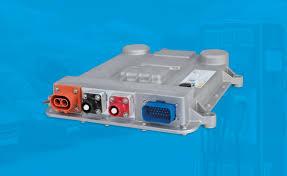Automotive DC-DC converters market strategic developments are increasingly focused on innovation and sustainability as the automotive sector transitions toward electrification. These converters are essential in ensuring efficient energy distribution between high-voltage traction batteries and low-voltage systems. With growing emphasis on energy efficiency, government regulations, and consumer demand for cleaner mobility, strategic initiatives are driving advancements in converter design, integration, and performance. Industry leaders are leveraging partnerships, mergers, and research efforts to create compact, reliable, and efficient systems that align with global electrification and sustainability goals.
Role Of DC-DC Converters In Automotive Systems
DC-DC converters play a vital role in modern vehicles by regulating power flow between high-voltage and low-voltage systems. In electric and hybrid vehicles, they ensure that essential functions such as lighting, infotainment, safety sensors, and communication networks operate reliably. By minimizing energy loss and optimizing system efficiency, converters directly influence vehicle range and overall performance. Their integration into smart and connected vehicle platforms also enhances real-time power distribution, supporting advanced features that are becoming standard in the industry.
Strategic Emphasis On Innovation
Innovation has become central to strategic developments in this market. Wide-bandgap semiconductors such as gallium nitride and silicon carbide are enabling more compact, efficient, and thermally stable converters. These advancements reduce system size and weight while improving performance, making them ideal for electric vehicles. Digital control systems are also being introduced, allowing converters to dynamically adjust to varying loads. By focusing on technological innovation, manufacturers can deliver solutions that address the rising demand for energy efficiency, safety, and long-term durability.
Sustainable Automotive Technologies Driving Growth
Sustainability is shaping strategic directions in the global automotive industry. Automakers are under pressure to reduce carbon emissions and meet stringent regulatory requirements. DC-DC converters support these goals by enabling efficient energy use and contributing to extended driving ranges. Integration with renewable energy systems, such as solar-assisted charging, further aligns converters with sustainability objectives. Strategic developments that emphasize eco-friendly manufacturing processes and recyclable materials are also being adopted, ensuring that converters contribute not only to vehicle performance but also to environmental responsibility.
Government Regulations Shaping Market Strategy
Policies promoting vehicle electrification and energy efficiency strongly influence strategic developments. Governments in Europe, North America, and Asia-Pacific are setting ambitious targets for emissions reduction and electric vehicle adoption. These regulations encourage investment in advanced power electronics, creating opportunities for innovation in converter design. Compliance with regional standards requires automakers and suppliers to align strategies with evolving regulations, ensuring that DC-DC converters remain indispensable components in electrified vehicle architectures worldwide.
Industry Collaborations And Partnerships
Strategic partnerships between automakers, semiconductor manufacturers, and technology providers are accelerating innovation in this market. Collaborations enable knowledge sharing, faster product development, and access to advanced materials. Joint ventures are focusing on scaling up production capacities and ensuring resilient supply chains for semiconductor components. Strategic mergers and acquisitions are also reshaping the competitive landscape, consolidating expertise to deliver next-generation solutions. Such collaborations are crucial in overcoming industry challenges while positioning companies to meet future market demands effectively.
Integration With Smart Vehicle Architectures
Future vehicle platforms emphasize connectivity, autonomy, and energy efficiency. DC-DC converters are evolving to meet these requirements by supporting complex energy demands across smart vehicle ecosystems. Intelligent converters with adaptive power distribution capabilities ensure that connected systems, autonomous driving technologies, and safety-critical components operate without interruption. Integration with vehicle-to-grid technologies also expands their role, allowing cars to act as energy contributors to broader renewable energy networks. These developments underline the strategic importance of converters in shaping the automotive future.
Regional Perspectives On Strategic Developments
Regional markets are adopting different strategic approaches. In Asia-Pacific, rapid electric vehicle adoption in China and South Korea drives large-scale investments in converter innovation. Europe emphasizes sustainability, with premium automotive brands leading advancements in compact and eco-friendly solutions. North America focuses on balancing consumer demand for connected features with energy-efficient technologies. Emerging markets are gradually implementing strategies for electrification, opening long-term growth opportunities. These regional differences highlight the global yet diverse nature of strategic market developments.
Challenges Impacting Strategic Direction
Despite progress, several challenges influence the strategic direction of this market. High production costs, particularly with advanced wide-bandgap materials, create affordability issues. Supply chain disruptions in semiconductor production threaten consistent availability of key components. Thermal management remains a technical hurdle, requiring innovative cooling solutions. To overcome these challenges, strategic efforts are being directed toward cost optimization, supply chain resilience, and advanced design methodologies. Addressing these issues will be critical to maintaining long-term market growth and competitiveness.
Future Outlook For Strategic Developments
The outlook for DC-DC converter strategies is strongly positive, supported by electrification, sustainability goals, and continuous innovation. Future converters will be smaller, lighter, and more energy-efficient, perfectly suited to next-generation vehicle platforms. As renewable energy integration becomes more widespread, converters will expand their role beyond vehicles to support broader energy networks. Strategic investments in research, development, and collaboration will remain critical for achieving these outcomes. By aligning innovation with sustainability, the industry is ensuring that converters remain key enablers of the automotive transformation.
Conclusion
The automotive DC-DC converters market is undergoing strategic developments focused on innovation and sustainability. By prioritizing energy efficiency, supporting smart vehicle integration, and aligning with global regulations, converters are shaping the future of automotive energy systems. Partnerships, technological advances, and sustainability-driven strategies are positioning the industry for long-term success. Although challenges such as cost and supply chain risks remain, the ongoing emphasis on innovation ensures continued growth. As the automotive sector evolves, DC-DC converters will remain essential to advancing sustainable, efficient, and intelligent mobility worldwide.

